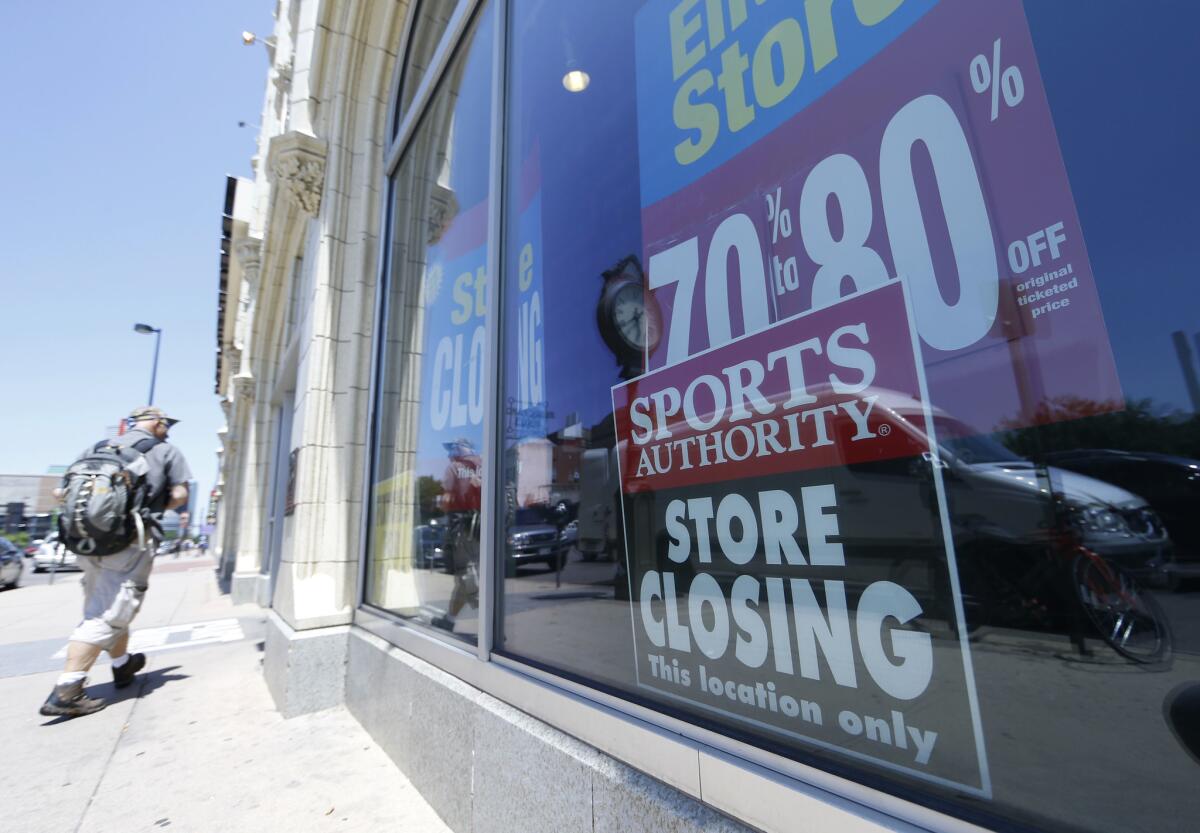In Sports Authority bankruptcy, customer e-mail data commands hefty sum

- Share via
When Sports Authority Inc. said “everything must go,” it meant everything – including its customers’ personal information.
The Colorado sporting goods retailer, which filed for Chapter 11 bankruptcy protection in March, auctioned this week its intellectual property, including the Sports Authority name, its e-commerce site and about 114 million customers’ files and 25 million email addresses. Dick’s Sporting Goods won with a $15-million bid.
The trove of customer data, experts say, could help Dick’s capitalize on Sports Authority customers looking for a new place to shop.
“It’s extremely valuable data for companies to identify customers who are looking for a new home,” said Hemu Nigam, chief executive of SSP Blue and cybersecurity expert.
As more companies come to understand the value of data, customer information has gone to the auction block during bankruptcy proceedings. Yet as consumers work to safeguard their data in the aftermath of high-profile breaches at companies such as Target and health insurer Anthem Inc., such sales mark another way customers can lose control of their personal information.
“Customer emails are stolen every day [but] they lack awareness that this is a possibility,” Nigam said. “The auction is raising awareness of another way customer data can be sold without even thinking about it.”
Businesses have the legal right to sell consumer information as long as their privacy policies make it clear that data can be transferred or sold if the company is acquired or goes under. Sports Authority stated its policy on its website: “We may transfer your personal information in the event of a corporate sale, merger, acquisition, dissolution or similar event.”
When a buyer obtains customer information through acquisition or merger, it often allows new customers to follow the same privacy policy they had with the previous firm. But it’s never a guarantee.
Vague language in a privacy policy can allow companies to force customers to play by new rules.
As it underwent bankruptcy proceedings last year, RadioShack tried to renege on a privacy policy that promised not to sell customer information or mailing lists. This prompted outcry from privacy advocates and eventually led to intervention from the Federal Trade Commission, which advised the electronics chain to only sell the information as a package with its retail stores.
The hedge fund Standard General bought RadioShack’s business and customer data for $26.2 million.
The FTC also intervened in 2014 when ConnectEdu, an education technology company, sold personal information of high school and college students, some of whom were minors. New buyers Graduation Alliance and Symplicity Corp. offered customers the choice of destroying their information.
Dick’s, which did not respond to requests for comment, could find many uses for the Sports Authority data.
Considering that Dick’s also spent an additional $8 million to obtain 31 Sports Authority leases in this week’s auction, it could use the data to see if there are specific regions where customers seem particularly loyal to Sports Authority. Experts suggest Dick’s could use the customer logs to court shoppers who had never purchased from its stores. Or it could survey Sports Authority customers to see why, exactly, they favored that business instead of Dick’s.
Still, privacy experts say any movement of personal data raises security concerns. How can customers know the new owner of their data will protect personal information as well as the last one?
“The type of company that would be most entertained by that information is most likely to exploit it,” said Jay Edelson, a Chicago privacy attorney. “Whether it’s identity theft or a scheme to defraud people by selling other things to them or reselling that list.”
Sports Authority and Hilco Streambank, which facilitated the auction, declined to comment on the record.
ALSO
Lionsgate buys premium channel Starz for $4.4 billion
Hershey rejects takeover bid by Oreo maker Mondelez
Fatal crash of Tesla Model S in autopilot mode leads to investigation by federal officials
More to Read
Inside the business of entertainment
The Wide Shot brings you news, analysis and insights on everything from streaming wars to production — and what it all means for the future.
You may occasionally receive promotional content from the Los Angeles Times.










